“We are in a REAL relationship,” Michael Ibeam Cline says as he explains why he and Elena Guerrero, his “love,” deserve to be together.
Cline is from New York, Guerrero from Spain, and the pair met in 2018 in the Russian Republic of Tuva in southern Siberia.
In the two years the pair has been a “loving and monogamous couple,” they saw each other numerous times, with Cline most often traveling to Guerrero’s home in Spain.
Cline and Guerrero are part of a growing group of people around the world demanding that travel exemptions be made for them.
Their message is often delivered with the tag lines: “love is essential” and “love is not tourism.” They are an impressive, growing group on social media, committed to being heard and ultimately allowed to travel to be together again.
Separated, binational couples – some married, many not – are fighting for their right to travel. They’re fighting for love.
Meeting the requirements
In late May, Denmark began allowing partners of its citizens from a handful of neighboring countries to cross the border. The requirement? Proof that the relationship had been in existence for at least six months.
Following privacy concerns, authorities updated the law to require only a signed declaration as proof of a qualifying relationship.
But if Denmark has made strides in recognizing this particular type of relationship, other places around the world have been slow to adopt similar policies.
From country to country, the rules around the reunification of domestic partners vary widely.
Typically, there are arbitrary boxes to be checked: Married. Proof of a shared residence. Proof of shared bills. Minimum time together: two years, not six months. A dependent child, in some cases.
Confusion surrounds nearly all of it. Closed US embassies in many regions of the world haven’t helped matters for couples where one is a US citizen.
Currently, a petition asking the embassies to reopen and help separated families is at about 1,500 signatures.
The US State Department could not immediately be reached for comment.
Although US citizens face some of the most severe travel restrictions of any other nation, they are not alone in their clamoring for travel exemptions.
Canadian resident David Edward-Ooi Poon was in Ireland with his girlfriend Alexandria Aquino when the travel restrictions were first announced in March. In spite of what Poon insists was overwhelming support in favor of their case – shared bills, mortgage on a condo containing Poon and Aquino’s names, common law relationship according to Canada’s definition – Aquino was unable to get to Canada in early April. Or, more accurately, Aquino arrived in Canada only to be forced to turn around and head back to Ireland.
They have been apart ever since.
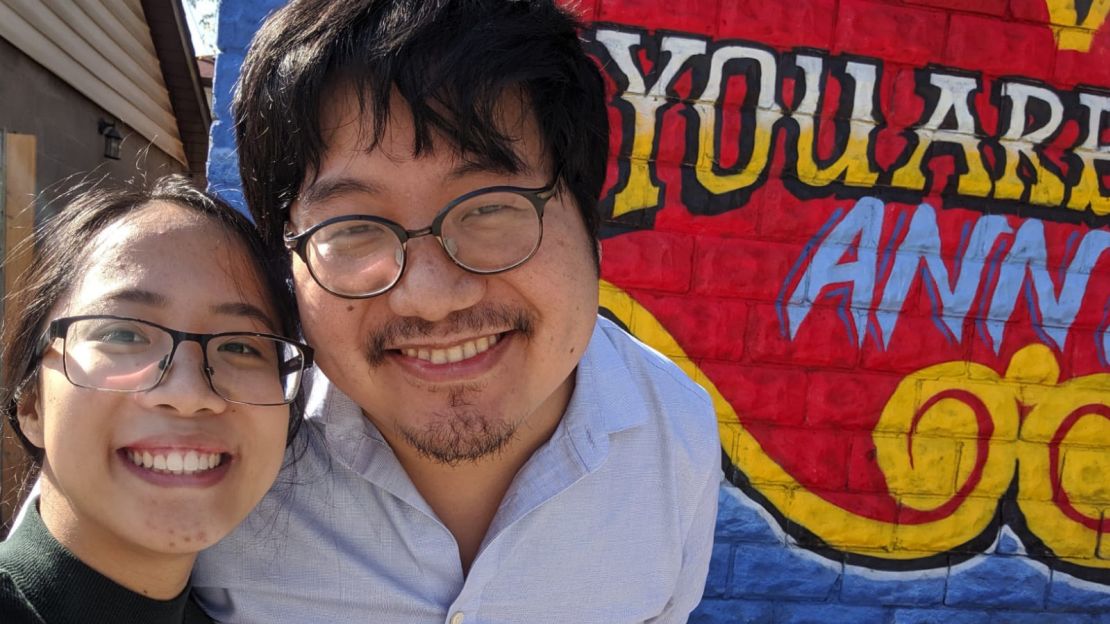
Quickly realizing that his situation under the new travel bans was far from unique, Poon founded the Advocacy for Family Reunification at the Canadian Border.
The program’s mission is to reunite separated families and couples in committed relationships like he and Aquino.
Poon says rather than enforcing a minimum length of commitment requirement, they’re modeling themselves after the European models of Denmark and the Netherlands.
“If you are willing to be financially and legally responsible” for your partner, that is sufficient proof, says Poon.
Poon’s program can’t do anything to help people with no ties to Canada, but separated couples have formed a strong coalition and have banded together in growing Facebook groups and on Twitter. Consistently using the hashtags #loveisessential and #loveisnottourism, they’ve begun to make waves.
In spite of several European nations making allowances, progress in certain parts of the world has been slow.
For US-Finnish couple Alyssa Warner and Ville Stång, obstacles mount.
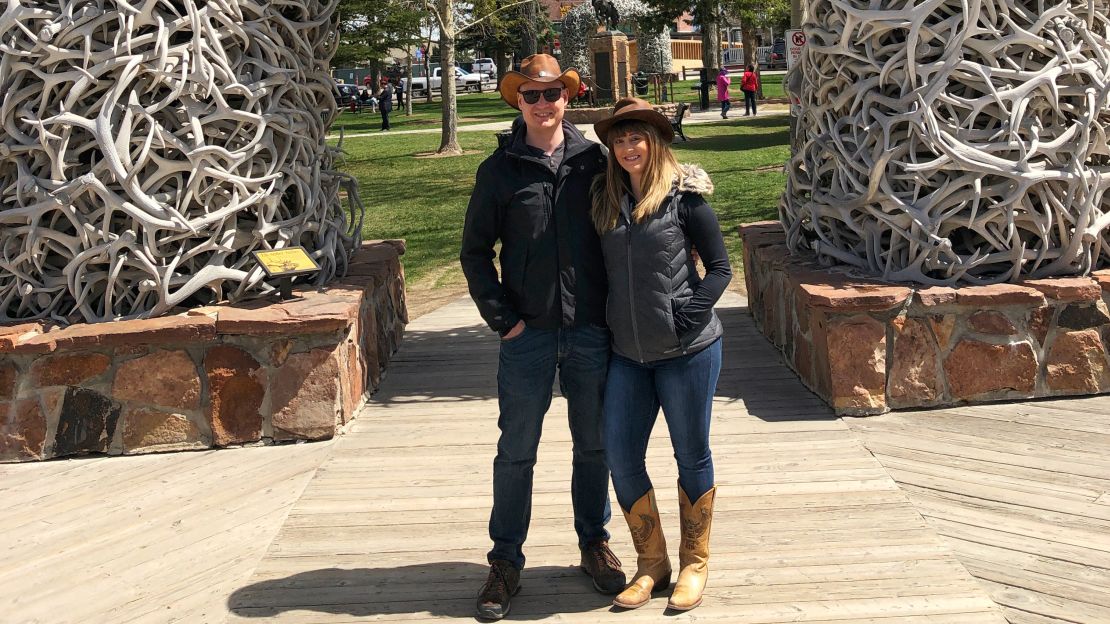
Finland continues to ban all Americans who are considered nonessential unless they are married, engaged or have been in a relationship for a minimum of two years and have proof of sharing a residence at some point in the relationship. Warner cannot travel to Finland to be with Stång because they don’t meet the requirement.
Warner and Stång spend hours each week navigating the news and looking for updates. They try to ascertain whether they can meet up at all and, if so, how.
Warner expresses concern over the severity of the US travel ban for Europeans coming to America. “It is clear that it is political and will likely be difficult for anyone to come to the US until the EU lifts its ban on Americans visiting Europe.”
That’s off the table for now, but the couple is considering a meet in Mexico, where they’d be forced to quarantine for two weeks before heading to Warner’s home in Colorado.
Third country loophole
Traveling to a country with loosened travel restrictions before heading to one of the home countries is an option that many couples are contemplating in spite of associated costs and health risks.
Warner says: “Cost is very much a concern regarding going to Mexico just to see each other. Neither of us feel like we should be forced to go to a resort or a vacation place just to see each other, but if that is what it comes down to, we will consider it.”
US citizen Rebecca Castro has been dating her French boyfriend Lucas Warin for two years and says they last saw each other in the United States in December. Plans for Castro’s partner to join her in Los Angeles permanently in April folded when the pandemic and its ensuing travel bans went into effect. After months apart, Castro says they are looking into meeting in Mexico or Croatia, but Castro says “it’s a very difficult and expensive process.”
After five months apart, Anne Löneke flew from France to Mexico to reunite with her German husband Benedikt Löneke, who is currently residing in NYC. The couple plans to make their way to the US following their time south of the border, a trip which Anne says cost about $3000 each.
Likewise Chicago-based AJ Wilton and her London-based partner JC Bonassin, found a way to make the third country reunion happen – they met in Mexico on Sunday. They plan to stay there two weeks as required before heading to Chicago together, thanks to JC’s Electronic System for Travel Authorization (ESTA), a digital travel authorization to travel to the USA, without a visa. Bonassin’s K-1 visa, the visa needed for fiancés, is in process. It’s been an expensive trip, Wilton admits, and it is not one that all couples in similar positions can afford to act on.
Cost and confusion
The cost of a nonvacation rendezvous in Mexico is one thing. Fees associated with visas and subsequent travel between regions with limited, reduced routes is another.
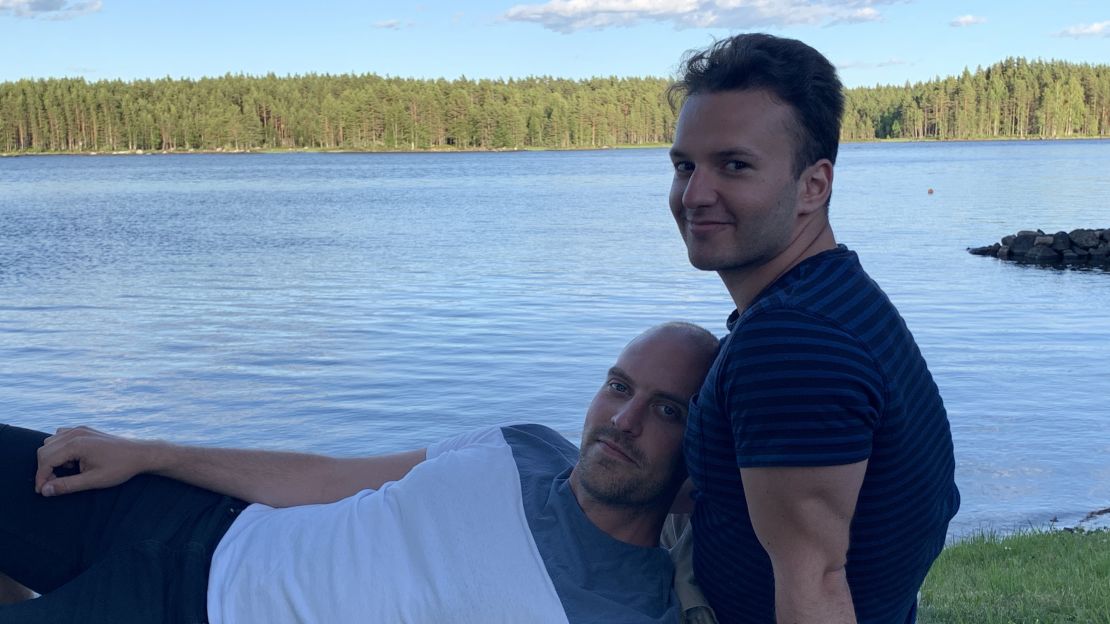
New York-based Eric Herbst, an active proponent of the #Loveisessential campaign, flew to Stockholm, Sweden, on Friday with an armload of documents proving he was in a serious relationship with his partner, Tobias Jakobsson. The flight was expensive, Herbst admits, though he was less anxious about the cost than he was the level of preparedness needed for a smooth journey and acceptance.
Herbst credits Ylva Johansson, the EU commissioner of home affairs, with his being allowed to travel to Sweden to reunite with Jakobsson after 128 days apart. Johansson, Herbst notes, is Swedish.
Herbst is happy to be in Europe, where he says partnerships are taken as seriously as marriages.
In the United States, where Herbst points out that as a gay man, he was only allowed to legally get married a few years ago, he believes relationships are only taken seriously and considered legitimate if you have a marriage certificate.
But that’s not for everyone, say Herbst and a slew of other couples who may get married one day or who may not choose that path at all.
Poon says there are a number of reasons people might not be married or not be planning to get married.
There are, he says, various religious, personal or LGBTQ+ reasons, and this concept – being in a relationship without the distinction of being married – is a “significant problem” that his group is trying to address.
Although the marriage hurdle is a real one, neither being married nor the intent to marry automatically ensures reunification, as many separated couples are now learning.
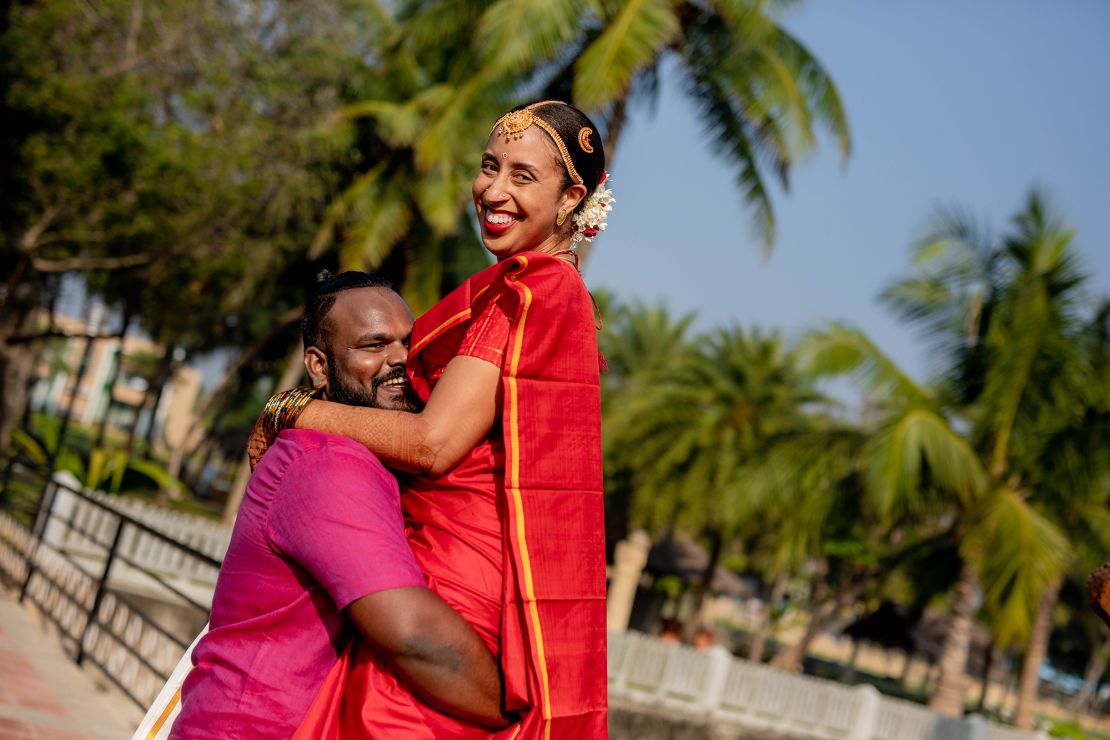
Madhav Shanmugam and Kylie Madhav married in February 2020 in India. Shanmugam was born and raised in Chennai and is there now, while Madhav is in the United States.
The couple planned to make their home in East Harlem, New York, where they also hoped to start a family. But then the pandemic hit, and now the couple find themselves attempting to decipher bureaucratic and logistical hurdles, according to Madhav.
Just last week, India announced it would resume flights between India and the United States, but this is not as straightforward as it sounds, Madhav says.
Although Madhav has had a 10-year tourist visa to India since 2017, in March, India announced that all previously issued visas would be null and void for the purposes of travel to India.
But although Madhav was issued a revalidated visa once she established her marriage to an Indian citizen, she maintains there’s “significant confusion on the part of airlines as to who is allowed to enter India,” which does not take into account associated costs of travel and visa-related fees.
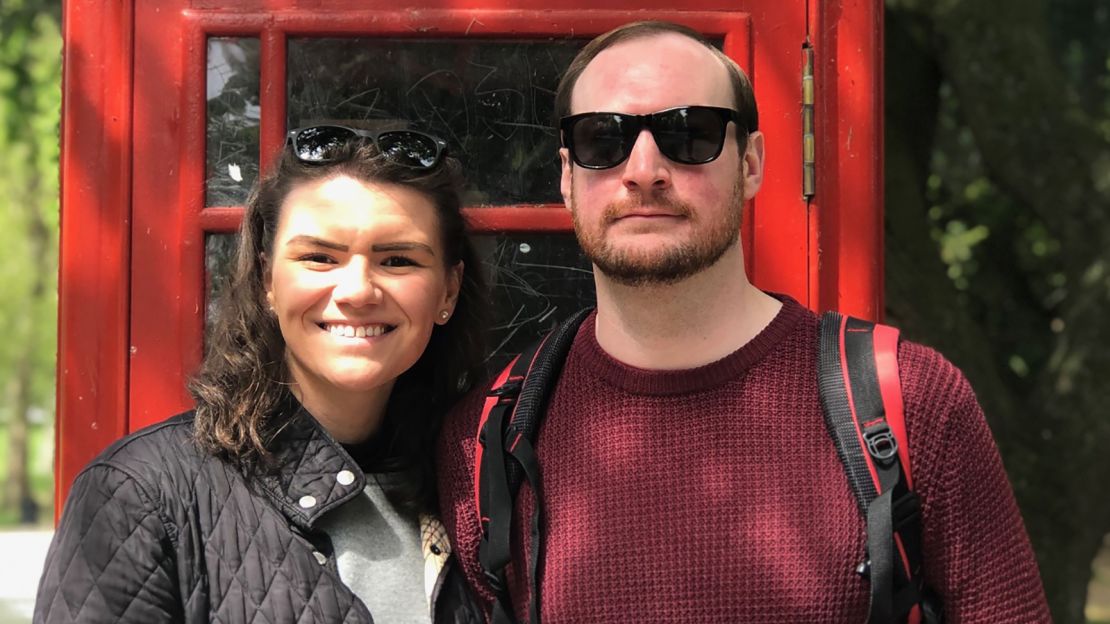
Connecticut-based Elizabeth Elliott was a week away from having her fiancé, Daniel Smith, with her full time in the United States, where they planned to marry and make a home.
Smith had successfully completed the K-1 visa process, when the coronavirus travel ban went into effect.
Before they knew it, Smith’s visa expired, and now the couple is scrambling all over again. As to what exactly they need to do to secure a valid K-1 visa for Smith, it’s hard to say.
“The US Embassy in London has been less than helpful in sharing exactly what it is we need to do. So there may be other costs we don’t know about,” Elliott says, listing off the potential fees: $535 filing fee; $265 fee for the online nonimmigrant visa application; $450 medical exam fee.
CNN travel has reached out to the US Embassy in London and not been able to get through to anyone.
Elliott says that’s all before actually getting married and that they’ll have to spend more to make the binational marriage official. Once married, the foreign partner, Smith in this case, will need to file for an adjustment of status (around $1,200) and a petition to remove the conditions on residence, which is another $595.
These fees are standard; the confusion and lack of clarity and transparency from the embassy are not, according to Elliott.
The visa fees, however, say nothing of the cost of the transcontinental flight at this time, which Elliott estimates will be around $1,500. Pre-pandemic, the couple was able to fly from the US to the UK and vice versa for less than half of that.
#Loveisnottourism
Herbst is insistent that the groups advocating for reunification and pushing government officials to see that “love is not tourism” are well-intentioned.
“We don’t want to spread Covid-19; we’re not tourists. We’re not looking for a holiday or a vacation,” Herbst explains.
The private Facebook group “Couples Separated by Travel Bans” is filled with people from all over the world in similar but different predicaments, supporting each other with encouraging words, calls to write letters to government officials, posing questions and curiosities on the third country loophole and giving recommendations of where to quarantine on a budget in NYC.
The group is full of posts sharing meet-cute stories and darker ones detailing the last time they saw each other.
Couples post pictures of themselves of happier times together pre-pandemic. They share stories of reuniting – in Mexico, Croatia, the Netherlands. They wait, anxiously, for better news – for any news – of border changes that will bring them closer to their loved ones.
They aren’t asking for open borders.
“We are just asking to be together,” Poon says.
